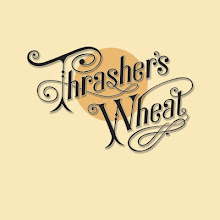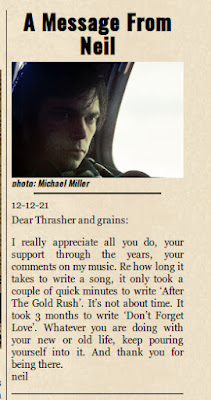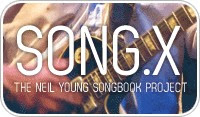"Steve Jobs Preferred Vinyl" Says Neil Young

AllThingsD Conference, Laguna Niguel, California, Jan. 31, 2012
Photos by Asa Mathat
Neil Young’s never ending quest for better sound continued today at the AllThingsD Conference in Laguna Niguel, California.
Last week, Neil Young declared support for Occupy Audio due to his anger about today's sound quality" and provided further elaboration at the AllThingsD Conference.
In an interview, Young said:
“Steve Jobs was a pioneer of digital music, and his legacy is tremendous. But when he went home, he listened to vinyl. And you’ve got to believe that if he’d lived long enough, he would have done what I’m trying to do.”

From Neil Young on Music Quality, Record Labels and Steve Jobs - Dive Into Media - AllThingsD by John Paczkowski:
“My goal is to try and rescue the art form that I’ve been practicing for the past 50 years,” Young said. “We live in the digital age and, unfortunately, it’s degrading our music, not improving it.”
“It’s not that digital is bad or inferior, it’s that the way it’s being used isn’t doing justice to the art,” Young said. “The MP3 only has 5 percent of the data present in the original recording. … The convenience of the digital age has forced people to choose between quality and convenience, but they shouldn’t have to make that choice.”
Also a topic of conversation during today’s interview: The recording industry, and whether the record label has outlived its usefulness. Young contended it hasn’t.
“What I like about record companies is that they present and nurture artists,” he said. “That doesn’t exist on iTunes, it doesn’t exist on Amazon. That’s what a record company does, and that’s why I like my record company. People look at record companies like they’re obsolete, but there’s a lot of soul in there — a lot of people who care about music, and that’s very important.”
Then why is it the case that some artists complain so much about the economics of the industry?
Said Young, “Those artists should go by themselves. They have a choice of what they can do. Artists who want to go it alone should just do that.”
Finally, Young discussed piracy, which he doesn’t view as the threat that some other musicians do.
"I look at [the] internet as the new radio," he explained. "Radio [is] gone. Piracy is the new radio; it's how music gets around."

From Business & Technology | Neil Young: Steve Jobs listened to vinyl | Seattle Times Newspaper By RYAN NAKASHIMA:
Young told the "D: Dive Into Media" conference Tuesday that he spoke with Jobs about creating a format that has 20 times the fidelity of files in the most current digital formats, including MP3.
Such a format, he said, would contain 100 percent of the data of music as it is created in a studio, as opposed to 5 percent in compressed formats including Apple's AAC. Each song would be huge, and a new storage and playback device might only hold 30 albums. Each song would take about 30 minutes to download, which is fine if you leave your device on overnight, he said.
"Sleep well. Wake up in the morning. Play some real music and listen to the joy of 100 percent of the sound of music," he said.
Although Young didn't have a practical plan for developing such a format - saying it's for "rich people" to decide - he said Jobs was on board with the idea before he died from cancer at age 56 in October.
"I talked to Steve about it. We were working on it," Young said. "You've got to believe if he lived long enough he would eventually try to do what I'm trying to do."
Young's opinion of Jobs was confirmed by interviewer Walt Mossberg, a journalist with News Corp.'s All Things D website, which has hosted Jobs at its conferences before.
Mossberg said Jobs in the past expressed surprise that "people traded quality, to the extent they had, for convenience or price."

UPDATE:
Also, see Neil Young Supports Occupy Audio.
Labels: AllThingsD conference, mp3, neil young, steve jobs, vinyl































 Human Highway
Human Highway

















 Concert Review of the Moment
Concert Review of the Moment





 This Land is My Land
This Land is My Land

 FREEDOM In A New Year
FREEDOM In A New Year









 *Thanks Neil!*
*Thanks Neil!*




![[EFC Blue Ribbon - Free Speech Online]](http://www.thrasherswheat.org/gifs/free-speech.gif)











 The Unbearable Lightness of Being Neil Young
The Unbearable Lightness of Being Neil Young Pardon My Heart
Pardon My Heart



 "We're The Ones
"We're The Ones  Thanks for Supporting Thrasher's Wheat!
Thanks for Supporting Thrasher's Wheat!




 This blog
This blog 
 (... he didn't kill himself either...)
#AaronDidntKillHimself
(... he didn't kill himself either...)
#AaronDidntKillHimself









































































 Neil Young's Moon Songs
Neil Young's Moon Songs




 Civic Duty Is Not Terrorism
Civic Duty Is Not Terrorism Orwell (and Grandpa) Was Right
Orwell (and Grandpa) Was Right


 What's So Funny About
What's So Funny About 



24 Comments:
Vinyl is groovy
But, unfortunately, expensive.
Neil is groovy.
Neil Young vinyl is the best vinyl in the world.
Neil's music is the best on this planet and beyond.
Mastering for vinyl is super cool with Neil.
Neil's records are expensive.
Quality whether you like it or not.
Unfortunately Neil doesn't like to sell vinyl.
He prefers to sell a piece of crap.
He prefers to sell cd's and mp3.
His music is hardly available in record stores.
Not on vinyl.
Le Noise is his best work in 200 years.
Sold out on vinyl.
No reprint.
A lot of young kids like this album.
And they like vinyl too.
No reprint.
Why?
Why keep talking about the best possible digital quality?
Analog is still a possibility.
And Gary Burden is cool too.
Love his work on 12 inch.
Neil's ideas about digital music are good.
Make it happen.
And until that day keep releasing albums on vinyl.
"Although Young didn't have a practical plan for developing such a format - saying it's for "rich people" to decide.."
..and that's the rub. Being an audiophile gets real expensive, real fast.
What I don't get is how NY retains such a discerning ear after all the years of audio assault he has subjected himself to. I'm glad he did, of course.
I'm somewhat confused here. A new format doesn't need to be created, downloadable music just needs to be offered in high quality formats that already exist. Apple Lossless, for instance, is quickly becoming an industry standard, and although it may not be as perfect as FLAC or vinyl, it is a far superior format to the MP3. Why not try offering Apple Lossless files through iTunes, and educating people about the differences between file formats? That way consumers have a choice, and I have a feeling that the majority of an educated public will prefer the higher quality.
And I agree with SoundMatters. If Neil cares so much, why doesn't he put his words into action? His vinyl records are too hard to find. He could allow users to download FLAC or other lossless formatted albums directly from his website like some artists do.
Anyways, I'm sure changes are on the way soon. In the last decade, file storage has become much cheaper, so larger capacity devices are becoming available and are affordable. Also, with the trend towards cloud storage, more people will be able to access huge music libraries on the mobile device of their choice, wherever they are.
From PCMag.com:
Death to the MP3. Long live vinyl, said rock icon Neil Young, speaking at an industry conference on Tuesday.
According to reports from the conference, the musician argued that digitally compressed music - both the CD and the MP3 - should burn out and fade away. And apparently Apple's Steve Jobs felt the same way.
Young also argued that piracy is just another form of music distribution. "Piracy is the new radio," said Young. "That's how music gets around."
Young has argued that the MP3 and CD should be tossed on the technology scrap heap, in favor of vinyl, a technology that's been around for decades. Just a few days ago, Young spoke at the Sundance Film Festival.
That's not what I read from the transcripts of this interview nor is it what I heard on the video. But that's what you get from computer genius-hack-types with limited reasoning capabilities when it comes to READING or HEARING a simple statement.
Here's the article link:
http://www.pcmag.com/article2/0,2817,2399679,00.asp
Continued:
It's typical for people to trivialize an issue like sound quality by reducing it to an argument "vinyl" vs. mp3 & Cd. That's not what this about~
What I heard Neil say is that due to the loss of quality in sound from mp3s & CDs, many people opt for vinyl. Even Steve Jobs listened to vinyl b/c clearly he heard a loss in sound quality, too.
The question he is throwing out there is how do we finally resolve the sound quality issue? a) invent new format; b) find a way to create sound quality that matches what we had with vinyl recordings?
This comment has been removed by the author.
The thing with Neil is that he is a sensitive guy. He writes songs in half an hour and records the songs in twenty minutes. But on the other hand you can say he has been working for 40 years on the new concept album that he just handed over to Reprise Records. Forty years is a long time to make an album. Have a look at the 'Horse Back" movie and all the equipment he collected to get the sound he wants. He only wants to give us, his fanatic fans, a change to listen to the stuff he recorded they way he heard it when he was recording it. That makes sense when you are a sensitive artist.
Ooops typo, change > should be chance or opportunity
This comment has been removed by the author.
If you take rumors about Ponotone into account, you have to believe that Neil isn't showing all his cards here....All this talk of some "rich guy" who is needed to make it happen is just him being coy. Neil has a company and it is clearly in "Stealth Mode". Who knows how successful it will be, but I believe this company is developing the hardware, software. Maybe they won't mass produce a new IPOD, but they can get the ball rolling. BTW, a full 24b/192k file with lossless compression, I believe, only requires about 2.5G per hour of music. I think that equates to about 100 albums of music on the latest IPOD. But the IPOD might not be designed to decode the high rez signal. It might not have the right DAC. So perhaps, there is the Rub.
And from my Archives BDL experience, I can say that the high rez songs come down a lot faster than 30 minutes/song. Most were less than 5min! Of course that is with lossless compression which should be considered fine.
Lot's of interesting discussions about this topic all over the internet.
Does anybody know how big these files are Neil is talking about?
Question:
I got 1940 songs on my iPhone.
(446 of them are Neil Young songs.)
They use a total of 7,2 GB of the capacity.
One of the songs on my iPhone is called "Don't be Denied"
At this moment it uses 9,7 MB of digital space.
How many megabytes do I have to save for this song if it would be released in the digital format that Neil is talking about?
In the interview, Neil said he handed in a new concept album to reprise yesterday (1/30). CH Americana?
The problem with today's records is not the file format per se. The 16-bit uncompressed audio file can sound great, and an mp3 made from a great-sounding uncompressed file can sound great despite some loss of quality. But in order for music to sound good in either of these formats the music must not be so compressed that a song has no dynamic range, which is the standard for today's records. In order to make louder and louder records the dynamic range has been reduced further and further. The 2009 remasters of the Beatles catalog sound great because they were not compressed in the idiotic way that most records are today. If we could put an end to the loudness war then records could sound good again (provided, of course, the music itself was any good).
I don't miss the LP.
We already have FLAC.
I love when he points out the fact that todays (21st century) sound is (way) worse than the sound from the "old" technology. It's a shame that (crApple for ex.) if they are not making a 2000 percent margin, then why bother offering the high res. option. The money I do not spend on todays commercially available music goes in to my ticket purchases. There are lots of good concert recordings (lossless or very close) of my favorites out there that get me through my days.
@Tom, you have a very good point. The cookie jar we have in our homes for leisure time hasn't changed much over the years, only the number hands who want we have stored in that cookie jar.
What people will spend for leisure time hasn't really changed. What has changed is the wide variety of options we have to be "entertained."
Telling people they're not getting their money's worth on sound quality is preaching to the choir -- valid only for people who value quality sound and have already compensated for this loss.
Neil's making a huge assumption here that people not in choir will demand better sound quality. Well, there's a lot reasons resting on why they're not members of the choir to begin with.
I love vinyl and prefer vinyl to CD or any form of MP3. BUT, I also want to listen to music without having to lug a ton of LPs around with me. And by and large, for most listening, MP3s, esp. at 192 or higher bitrate, are just fine.
The point I think many people miss is that great music sounds good regardless of the format. I remember being younger and listening to opera on AM radio fading in and out...and still being amazed. Similarly, Neil sounds great on my old scratchy LPs. Sure, it's nice to hear pristine LP sound from audiophile equipment, but I rarely have time for that anymore, and frankly don't have sensitive enough ears anymore to fully appreciate it anyway.
I do agree with the earlier posters suggesting Neil make LPs easier to find and cheaper to buy.
I'm scrounging for quantity Neil these days anyway....
Charlie
Neil's comments have made the front page of reddit today.
Karl
This story grabbed my interest, because I know of Young's long term dedication to sound quality. And also just because it was an interesting idea that these two could be discussing a major move forward.
But realistically, I wonder how far he could ever have got with Jobs (or could get now, with just Apple). I suspect Jobs and Young would have struggled to find common ground. Jobs may have liked vinyl, but he liked Apple a whole lot more.
True, the iPod itself is quite an innovative product, but from the very beginning, it was about quantity over quality, "1000 songs in your pocket" and all that crap.
And mainly what it is is a shamefully locked piece of equipment, a vehicle for Apple's proprietary obsessions.
Consider.
We've had "hi-def" digital sound for at least 15 years now, even DVD Video has 24-bit sound written into its standard (Google the Bob Stuart interview in Stereophile). Yep, you can run off a lovely hi-def audio disc on a cheap DVD-V blank.
We've had hi-def digital disc formats that didn't too well commercially - DVD-Audio and SACD, and now we have hi-def audio on Bluray. And we have what may be the true home of hi-def, computers. And where has Apple really been in all this? Nowhere. Jobs and Apple have been completely silent on the subject, and where their equipment can even handle this stuff, they're usually very late to the game.
Instead, they've had a separate but extraordinarily lucrative existence where they developed the iPod and iTunes, got people buying a song at a time for a dollar a time, and did nothing to disabuse people of the idea that MP3 was all they needed.
If Jobs knows vinyl sounds great on his billionaire-class turntable, why didn't he do more to promote higher quality digital audio for the plebs? He's had ten years with the iPod, more than enough time considering that during the same period, audiophiles have adopted high quality computer audio in a very big way.
Instead, the iPod is more about what you _can't_ do. No SPDIF or other way to get the digital signal out to a DAC. If you want to do that, you have to buy a Wadia box (licensed by Apple) for $300. And that's not the external DAC, it's just a digital middleman. Unlike an external DAC, which can be an extremely versatile audio device that deals with multiple sources, it presumably has no function other than getting digital off an iPod and passing it along. You can't plug it into anything else or do anything else with it. For $300! It's basically a license in box form.
http://www.stereophile.com/digitalprocessors/1008wad/index.html
Now it would be perfectly possible for Apple to just build digital-out capability into its iPods - in the same way a $30 PC soundcard can do it, a DAT player can do it, a CD player can do it (I do all three right now). Instead, the iPod is permanently prevented from reaching its full hifi potential - as a digital transport - unless you take Apple's approved, Apple-takes-a-cut-of-the-money route. Isn't it interesting how the iPod, in 2012, can't do things that a CD player or a DAT could easily handle in 1990?
Compare that to how you freely move music files around on a computer, swap between computers, send out to a DAC, basically do whatever the hell you want with them, and you see that the iPod is classic crippleware.
Now how many of us really believe that the Jobs-Young summit would have produced results that weren't weighted in Steve's favour? I've got the greatest respect for Neil Young and what he's achieved for audio over the years - he's a frigging _hero for the way he's pushed this issue - but I'm convinced Jobs would have obstructed or circumvented him one way or another.
So what have we got?
Neil Young: brought out the Archives - his BABY - on Bluray.
Steve Jobs: Blu-ray? What's that?
http://gigaom.com/apple/tasting-the-forbidden-fruit-blu-ray-on-the-mac/
And there you have the difference between the two in a nutshell.
@Anon (8:41am) ... I believe that Jobs recognized the vast difference in sound quality with regards to his device(s)he was putting out and what is/was achievable. It was probably hard for him to do anything about it when millions and millions of people are lining up to give him their money. The whole proprietary thing sucks and builds animosity. I have an iRiver multi codec from the 90's that crushes the ipod. It was almost comical when microsoft enetered the arena with the Zune. It's a shame because that was a pretty neat piece of technology, unfortunately they tried to copy the Apple model... they can keep it.
cnn.com has picked up on this per link below..check some of the Comments if you want a good laugh!
http://www.cnn.com/2012/01/31/tech/web/neil-young-apple-high-def-music/index.html?hpt=hp_bn6
Sound is the blood
Between me and you
--Wild Flag
Thank you for sharing this article, I've got to agree with Steve. Nowadays file sharing is so dominant.
document scanning services
Post a Comment
<< Home